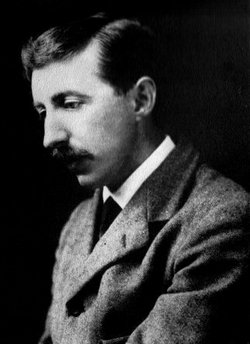| Home | The Author | "THe Machine Stops" | Literary Analysis | The Machine Today | Inventions | More Information | Sources |
E.M. Forster  |
||
| Born: January 1, 1879 Died: June 7, 1970 |
|
|
A brilliant, respected author of thirteen novels, multitudes of essays and short stories, and the namesake of the “Forsterian” (liberal, unconventional, skeptical, moral) epithat, E.M. Forster is a man that deserves special attention. Edward Morgan Forster was born in London on New Year’s Day, 1879. An only child, Forster’s father (also named Edward Morgan) died of tuberculosis when Forster was only 18 months old, leaving Forster to be raised by his mother, Alice Clara Whichelo, and five paternal aunts. Legacies from his father and a late great-aunt financially secured Forster’s educational future. He attended Kent House preparatory school in Eastbourne, and attended the Tonbridge School from 1893 to 1897. Forster abhorred Tonbridge; the time he spent there served as the model for the schools in his first two novels, and the basis of his lifelong criticisms of the British Public School System, which he believed churned out youth “with well-developed bodies, fairly developed minds, and underdeveloped hearts.” After Tonbridge Forster studied at Cambrige (1897-1901), the alma mater of greats like Marlow, Dryden, Milton, and Coleridge, and fell in love with writing. The inheritance that paid for his education also allowed him to pursue writing full time, and his work began to appear in print when he was twenty-four; his first novel, the critically acclaimed Where Angels Fear to Tread, was published when he was only twenty six. Following his time at Cambridge Forster traveled widely. In Selected Letters of E.M. Forster, Volume One, editors Mary Lago and P.N. Furbank describe the extent of his globetrotting: “His…letters came back to England from the most far-flung locations: Egypt and Inda, Romania and Scandinavia, South Africa and the United States, and from every point of the Continental compass. The envelopes would have been a stamp-collector’s delight. Everywhere he went, he struck up new correspondences, and some of these lasted a lifetime.”
Novels Short Stories (Collections) Opera Non-fiction Biographies Marianne Thornton, A Domestic Biography (1956) |
||